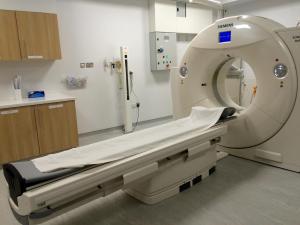
By Jonathan McCambridge, PA
A new 10-year cancer strategy aims to ensure that everyone in Northern Ireland has timely access to diagnosis, treatment and care, health minister Robin Swann has said.
Launching the strategy today, the minister also revealed that two rapid diagnosis centres are being set up in Whiteabbey and South Tyrone hospitals.
He said the aim was that the centres would welcome their first patients later this year.
Mr Swann said: “Unfortunately, cancer will impact on all our lives at some point either directly or indirectly.
“Therefore the central vision of the new strategy is to ensure that everyone in Northern Ireland, wherever they live, has equitable and timely access to the most effective, evidence-based referral, diagnosis, treatment, support and person-centred cancer care.
“Regrettably, cancer services were challenged before the pandemic and there continues to be significant capacity and workforce challenges across a range of areas.
“Therefore there is a need to move forward urgently to implement the actions outlined in this strategy to rebuild and transform our services in the short, medium and longer term.”
The strategy sets out 60 recommendations for strategic changes to be taken forward over the next decade in the themes of preventing cancer, diagnosing and treating cancer, supporting people to live and die well and implementing the strategy.
Mr Swann said: “The rapid diagnosis centres will be piloted at both the South Tyrone Hospital and the Whiteabbey Hospital, and will enable patients from across Northern Ireland who have non-specific but concerning symptoms to get diagnosis support when they do not meet the criteria for red flag referral.”
The strategy is published alongside a funding plan which identifies an estimated investment need of around £2.3 million in the first year and in the region of £145 million per year when all actions are implemented. A capital one-off investment of approximately £73 million is also required.
The minister said: “Addressing the challenges currently facing cancer services in Northern Ireland, and implementing the strategic improvements greatly needed and so long sought for, is dependent on the availability of significantly increased and sustained funding.
“Unfortunately, cancer services in Northern Ireland have historically been underfunded in comparison with other UK jurisdictions.”
Cancer Research UK’s public affairs manager in Northern Ireland Barbara Roulston said: “People affected by cancer in Northern Ireland have waited a long time for a new cancer strategy so this publication, which outlines an ambition for world-class cancer services, is very welcome.
“It has the potential to prevent more cancers, diagnose the disease earlier and improve patient care.
“However, after the draft budget collapsed last month, the funding needed to make these plans a reality has not yet been confirmed.
“Without investment, the impact on patients could be devastating as staff shortages take their toll and health services are unable to take advantage of the latest equipment, tests and treatments.”


 Guidance sought over future of colourful parakeets in Belfast park
Guidance sought over future of colourful parakeets in Belfast park
 Woman released after questioning over pipe bombs in Co Down
Woman released after questioning over pipe bombs in Co Down
 Suspended chief constable will not be prosecuted over alleged sexual offences
Suspended chief constable will not be prosecuted over alleged sexual offences
 MI5 files not deliberately withheld from Stakeknife probe, review concludes
MI5 files not deliberately withheld from Stakeknife probe, review concludes
 Taoiseach urges gardai and others to testify at Omagh bomb inquiry if asked
Taoiseach urges gardai and others to testify at Omagh bomb inquiry if asked